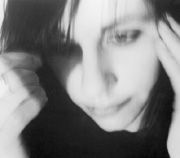In the real world, four years isn’t a long time, but in the music industry, it’s an eternity. Four years have passed since the last Curve record, and fans have waited patiently—sitting still for myriad artists and subgenres that Curve subtly (and not so subtly) influenced; wading through the Garbage, through trip-hop and watered-down electronic-pop—to hear the sublime Toni Halliday’s voice shrieking through Dean Garcia’s dense musical canvases.
Curve
Showbox, Monday, June 29
Come Clean is not as thick as past Curve efforts, but it’s no easier to stomach. On previous records, like the damning Doppelganger, sounds compete in a fistfight of fractured guitars, bastardized industrial drums, and Halliday’s careening, unstable vocal personas. With Come Clean, the duo comes clean: Garcia streamlines the crowded landscapes, exposing clear, crisp melodies, taut beats that owe more to techno than industrial, and Halliday’s vocals proudly announce their presence. “Hello! Here I am,” she says with a lick of her lips.
Irreverent and uncompromising, Halliday nailed her first recording contract at 14; at 16, she recorded some “average, middle-of-the-road kind of stuff. It was quite pop,” she says from her Atlanta hotel room. Not content to become a sort of lone Spice Girl, she left the label. “Eventually I wrote my own song, and that’s what made me kind of go in my own direction. It was a lot more punky, and they were like ‘No, no, no,'” she recalls.
Despite the attention showered on her powerful voice, Halliday takes her talent lightly. “I don’t really have much respect for my voice, to be honest. I smoke and I drink and I never do warm-up. You’ve got your voice as long as you’ve got it, and when you’ve haven’t got it anymore, that’s it, it’s gone. Get a life,” she says. Halliday quickly contemplates life without singing: “I don’t know, I’d get into psychotherapy or psychology or something. That’d be a booming business right—only do pop stars?” she says with a laugh. “I’ll be like, ‘Darling, I relate, I’ve been there.'”
Not surprisingly, even as a young girl, the singer’s instincts led her to music with a darker edge, something more unsettling—something like Curve. Unlike Garbage—that shameless pop band with whom Curve garners so many misfired comparisons—Curve goes down like a bitter pill. The music afflicts rather than comforts.
This astringency could be one reason why Curve’s music—with its strange bedfellows of industrial, techno, rock, and pop—flew right over the heads of the pre-electronica masses. The duo’s last live date in Seattle occurred at the height of “grunge.” “They were just standing there with their mouths open,” Halliday remembers. “They were either totally blown away or they had no idea what we were doing.”
Shortly afterwards, Halliday and Garcia took an indefinite hiatus to recoup and wait for the world to catch up with them. Halliday lent her voice to projects by Leftfield, Paul Van Dyke, and Freaky Chakra. Now it’s 1998, and amid Prodigy and the Chemical Brothers, Curve doesn’t seem so alien. “‘Electronica’? I don’t even know what it means,” Halliday says; but she also calls rock traditionalists, those folks who cling to their guitars, “small-minded. They just haven’t seen the future yet.” Which leads you to wonder if they ever will see the future—the one that Curve is helping shape. We’ll just have to hurry up and wait.





